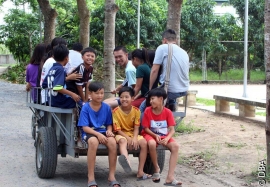In a socio-political context that for the Catholic Church is more favorable than in the past, Vietnamese Salesians work mainly in parishes and vocational training schools. They began by opening parishes and, since the 2000s, several training centers for the poorest of young people. Each new center begins modestly and gradually, based on funding and resources, it develops. The "Don Bosco" school in Phuoc Loc, started in 1993, now has 700 students with 150 students graduating in automobile mechanics, general mechanics or welding, thanks to the work of 40 teachers, including 8 Sons of Don Bosco .
These centers often do not have many resources, as school fees are deliberately kept low to help students and their families. Students frequently reside in the internal boarding house, because it would otherwise be too difficult for them to go home every weekend. In addition, Salesians often provide financial support to families, provided the young person is seriously willing to learn. The end result is that for many the school is a second family.
In order to cope with the lack of qualified teachers, the centers often set up partnerships with companies, so that business professionals go directly to teach, receiving, in return, the certainty of having future qualified workers among their students to hire.
The Salesian professional schools also welcome young migrants. In fact, as in Italy in the days of Don Bosco, the country is experiencing a strong rural exodus: 50% of Vietnamese youth now live in urban areas; many came from outside looking for a job. And when these children arrive at a Salesian school, they are sometimes more than 300 km from their native village.
For the Provincial, Fr Joseph Nguyen Van Quang, Salesians today must satisfy new needs. First of all in the North, where, although there are already 9 Salesian houses - parishes, youth centers, job centers, formation, and the like, there is still much to do for young people and several bishops have even invited the Salesians to come.
Source: Don Bosco Aujourd'hui


